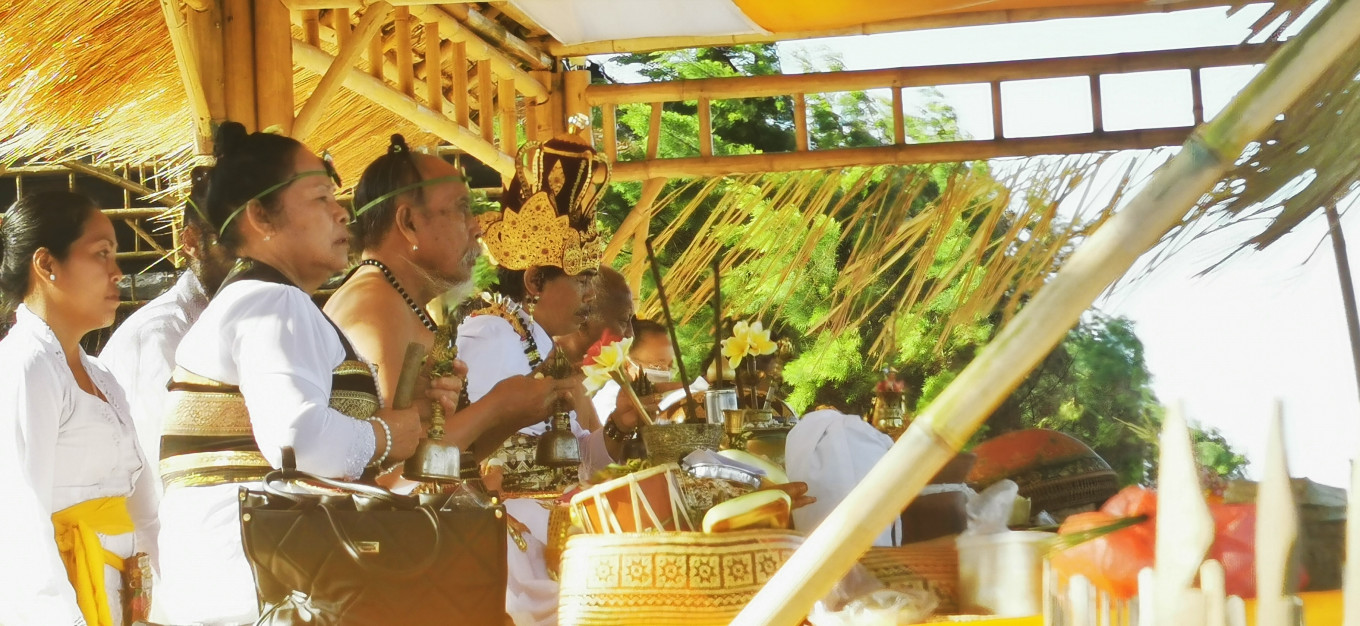Popular Reads
Top Results
Can't find what you're looking for?
View all search resultsPopular Reads
Top Results
Can't find what you're looking for?
View all search resultsAn island running dry: A sustainable solution to Bali on the world stage
Water scarcity can lead to poverty, food insecurity and displacement.
Change text size
Gift Premium Articles
to Anyone
As the World Water Forum unfolds in Bali, a critical issue takes center stage: Water scarcity.
This global event, convening water experts and decision-makers every three years, provides a unique platform to tackle this pressing challenge. Nowhere is this challenge more evident than on the very island hosting the forum, Bali, the “Island of the Gods.”
Decades of tourism and unchecked development have strained Bali’s water resources to a critical point. The Ayung Watershed, a vital source of life for the island, exemplifies this crisis. Over-extraction of groundwater and deforestation have led to increased water runoff, jeopardizing the water security of communities and ecosystems.
The consequences are dire. Vulnerable communities, particularly those reliant on agriculture, are the first to suffer.
Water scarcity can lead to poverty, food insecurity and displacement. The increased water runoff caused by deforestation weakens the soil, making it more susceptible to devastating landslides. Furthermore, saltwater intrusion becomes a growing threat as freshwater reserves dwindle, contaminating coastal aquifers and rendering them unusable for agriculture or drinking.
However, a beacon of hope shines from the Ayung Watershed. A payment for ecosystem services (PES) scheme offers a promising approach to tackle this challenge, and is being presented as a case study at the World Water Forum.
PES is a market-based solution where water users, such as businesses, provide financial support for sustainable land management practices by local communities. These practices include building infiltration wells to replenish groundwater reserves and implementing regenerative agroforestry techniques that improve water retention in the soil.
A key aspect of the Ayung Watershed PES scheme is multi-stakeholder collaboration. It brings together government agencies, businesses, NGOs and local communities to achieve a common goal, improving Bali’s water security.
This initiative showcases the potential of PES as a tool for financing water resilience and promoting sustainable development, offering valuable insights for the global water community gathered at the World Water Forum.
This year's World Water Forum theme, "Water for Shared Prosperity", underscores the urgent need for innovative solutions like the Ayung Watershed PES scheme.
The global context for water scarcity is stark. Droughts plague many countries year after year. Nearly half of the world's water bodies are compromised by poor water quality.
The United Nations has estimated about half of the world's population, 4 billion people, face water shortages at least once a year. By 2025, 1.8 billion people will have to endure severe water shortages.
Climate change and land-use practices are further degrading water resources, while demand for water is expected to surge by 20-30 percent by 2050, fueled by a growing global population.
A leading challenge is balancing immediate human needs with the long-term health of freshwater ecosystems. The PES scheme offers a promising contribution to achieving this balance.
By financially incentivizing landowners to adopt sustainable land management practices, these programs can achieve a double win. Upstream communities benefit from financial rewards for their conservation efforts, while downstream users enjoy improved water security.
This approach, built on multi-stakeholder collaboration, protects vital water resources and reverses the degradation of ecosystems, contributing to a sustainable water future. The Ayung Watershed PES scheme, an example of effective collaboration, has the potential to be a replicable model for water-stressed regions around the world.
The World Water Forum presents an important platform to showcase this scheme as a promising model for water management, and stimulate discussions on how PES can contribute to global water security.
By working together, we can turn Bali’s experiment into a blueprint for a more sustainable water future, one where shared prosperity is built on a foundation of shared resources.
***
The writer is managing director at Kopernik, an Indonesian-based research and development (R&D) lab for social and environmental challenges.











